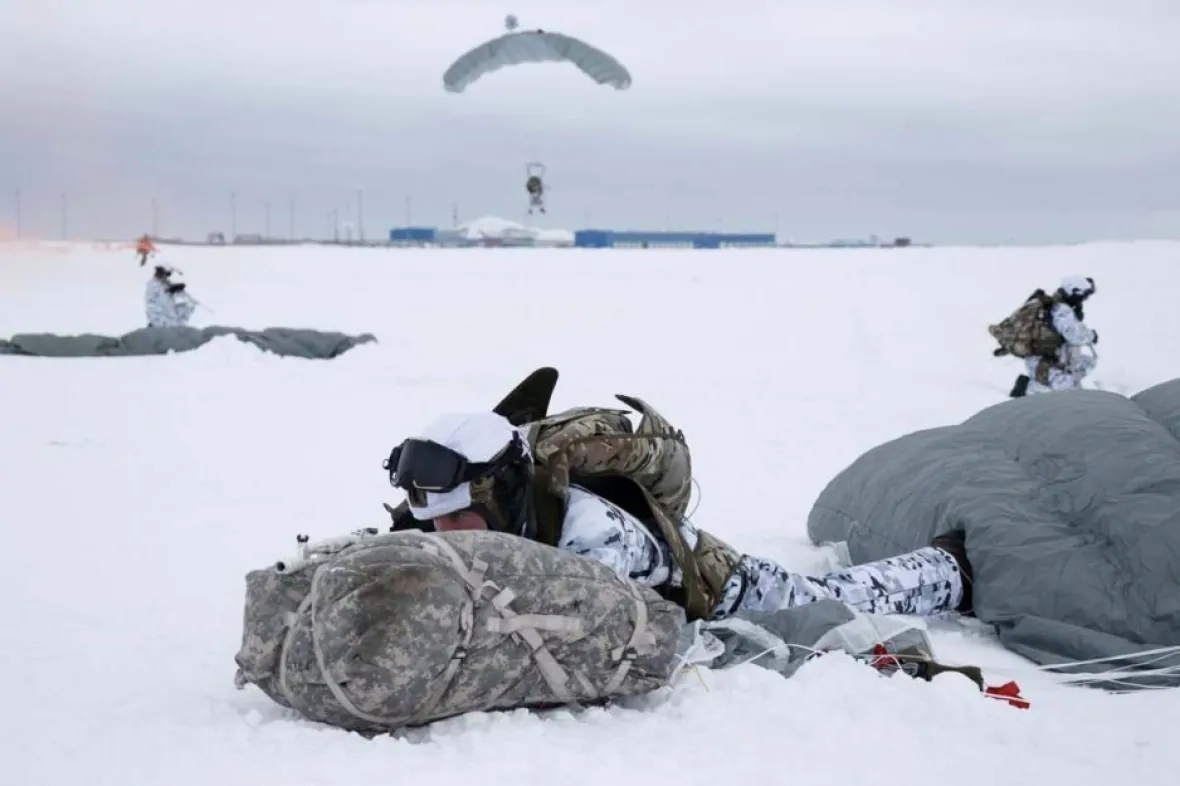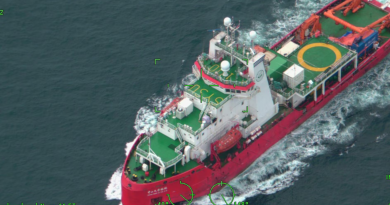Russian Arctic military exercise draws awe and concern

The online visuals are stunning, and they are meant to be.
At a high altitude, Russian paratroopers tumble from the belly of a giant transport plane into a sky of cotton clouds and then proceed to fight a three-day mock battle in a winter wasteland.
The recent exercise on Franz Josef Land, a Russian archipelago of largely uninhabited islands in the High Arctic, has set the defence and diplomatic communities abuzz, particularly in Canada, which has its own Far North island chain.
The paratroopers jumped from an Ilyushin Il-76 transport aircraft from a height of 10,000 metres (30,000 feet) and were, according to the Russian Defence Ministry and media reports, testing new equipment developed for extreme cold weather operations.
They used specialized oxygen masks, navigation and parachute systems.
Russia’s deputy defence minister, Lt.-Gen. Yunus-Bek Yevkurov, boasted the April 25 exercise was a first of its kind from such a height.
It was an incredible display and an extraordinary test of endurance for the troops, said a Canadian defence expert.
“It’s the highest altitude drop we’ve seen,” said Andrea Charron, director of the University of Manitoba’s Centre for Defence and Security Studies.
“Once they landed, they completed a three-day combat training exercise, and that is just an incredible feat of human endurance whether you look at it from a military perspective, or any perspective. That is just an incredible display of logistics, courage and ingenuity.”
With COVID-19 and the related economic collapse dominating the headlines, the event received little attention in the western media, but was given prominent play in Russia and throughout eastern Europe. The reports were accompanied by a slick video with spectacular footage shot by the helmet-cam wearing paratroopers and videographers on the ground.
It was billed by the Russian Defence Ministry as a commemoration ahead of the 75th anniversary of the end of the Second World War.

A message to NATO?
Defence experts in this country are divided on what message was being conveyed by the demonstration and whether it should serve as a warning to NATO, particularly Canada, Norway and the United States.
“I’m not sure NATO should imply any sort of intent by this exercise,” said Charron, who is an expert in Arctic warfare.
“Russia is known for pushing its military to do the impossible, and this is a great way to get some great photo opportunities to detract from the fact that Russian now has over 200,000 confirmed COVID cases and by all accounts Russia is not managing it very well.”
But Rob Huebert, a defence expert at the University of Calgary, said demonstrating they can seize an Arctic island in messy weather in late spring is an unmistakable message from Russia to NATO.
“The Russians are very serious when they say they want to be the military power in the Arctic region,” Huebert said.

Russia’s Arctic ambitions
Norway and Canada, in particular, should both be paying close attention, he said.
The exercise, Huebert said, needs to be put in the larger context of Russia’s other Far North activities, including the reactivation of long-abandoned Cold War Arctic bases and the installation of sophisticated air defence systems.
A sizable portion of Russia’s nuclear deterrent is found in its ballistic submarine fleet, which sails from northern bases. Huebert said Russia’s Arctic ambitions are partly about northern resources being laid bare by climate change, but also a reflection of its desire to demonstrate that no one is going to mess with its nuclear fleet bases.
And it is for those reasons that Charron said western leaders must think carefully about Russia’s possible motivations, particularly at this uncertain time.
“I think this is a wake-up call because I don’t think we really understand Russian military strategy as well as we think,” she said.
“My big concern is that we misinterpret, misread what the Russians are doing, or vice versa, in these especially tense times given COVID-19, given the concerns about the world economy. This is where you get misunderstandings, incidents and accidents.”
Western militaries ‘have to step up’
Canadian and U.S. troops have, for years, conducted their own cold weather Arctic exercises, including parachute drops.
The Russians, however, conducted their drill while the weather was still pretty miserable, not in the summer when Canada’s main Arctic training — Operation Nanook — takes place, Huebert said.
There have been Far North exercises in winter, said Charron, but the Russians have figured out how to do it on a sustained basis, which likely troubles western militaries that “will have to step up and see whether these are skills we need to work on.”
Commenting on previous Russian exercises, some senior Canadian military officials have said the chances of fighting in the North are pretty slim because of the climate and that an offensive operation would quickly turn into a search-and-rescue mission.
“We have laughed at Russians,” Huebert said. “I don’t think we’re laughing any more.”
Related stories from around the North:
Canada: Canada, U.S. must do more to check Russian military in the Arctic, says NORAD chief, CBC News
Finland: Finnish Defence Minister tells party leaders shrinking fighter fleet would be “irresponsible”, Yle News
Iceland: Iceland talks Arctic, Trump’s ditching of climate accord, with U.S. Secretary of State, Eye on the Arctic
Norway: Norway strengthens its Arctic military in new defense plan as security concerns grow in the region, The Independent Barents Observer
Russia: Report: Moscow sees Finland as friendly, but not a major EU player, Yle News
Sweden: Arctic Sweden to welcome thousands of international troops for Northern Wind exercise, The Independent Barents Observer
United States: U.S. experts call for ‘vigilance’ on Russian military buildup in Arctic, Alaska Public Media




We should admire and respect them as all they want is to be happy and feed their families and we do.
Nato, its puppets and masters demonize Russia and Russians alike for many decades, enough.
Putin expressed many times as China leaders as well the honest wish to be friends with the west.
Seems that the decadent ’empire’ is jealous about the ever growing trade power of Russia and China.
The U.S. dont even have fast trains crossing their lands, their highways are in need of repairs yet nothing is done, poverty, bad health care for its citizens, but they prefer to feed the very rich behind arms and weapons factories always looking for an excuse, being Russia fake threats or China high technology wireless advances, making the world an unsafe place without real Peace.
I am not afraid at all of Russia, more afraid one should be against the filthy breach of privacy we all have in our so called social media.
absolutely agree Cann, in spite of all the countless western media campaigns trying to discredit Russia, you still don’t see much of anti-western sentiments in Russia. They’ve got a hell lot of work to do in that vast country. I like following their Arctic projects and wish them luck
Well done Russia!